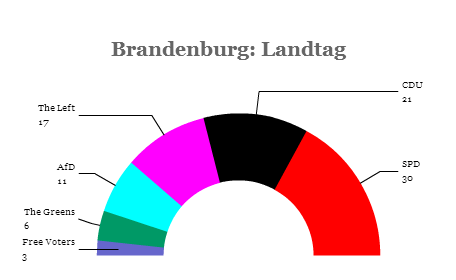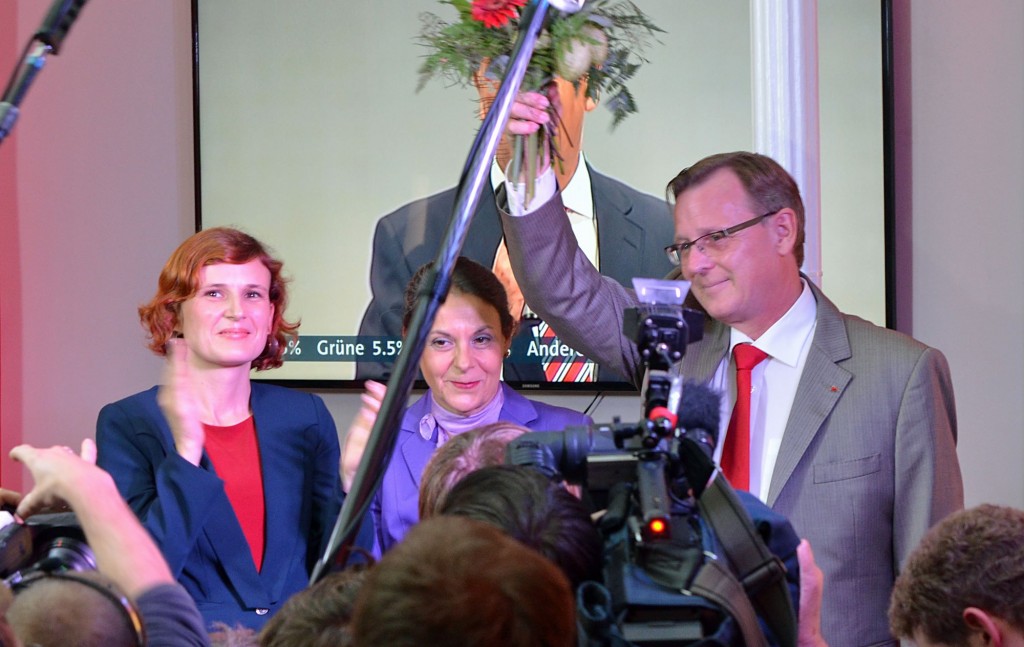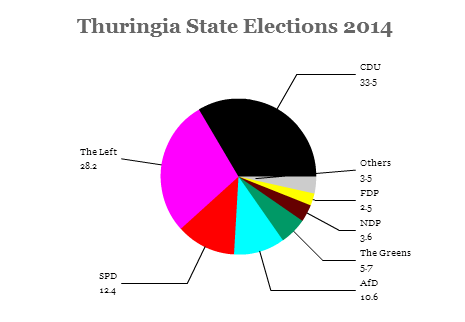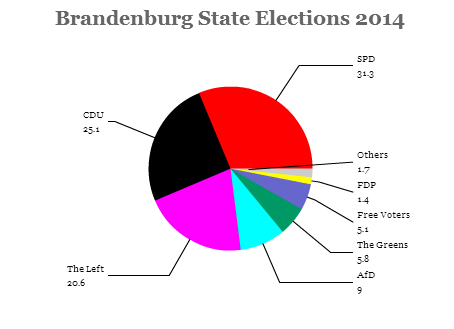With the world’s attention more focused on Scotland’s independence referendum this week — or even on Sweden’s national elections — it’s tempting to give short shrift to two state elections in eastern Germany last weekend. But, taken together, they portend major implications for the future of German politics.
The first is the now undeniable rise of the conservative, eurosceptic Alternative für Deutschland (AfD, Alternative for Germany). Having narrowly missed the 5% threshold to win seats at the national level last September, the AfD won nearly 10% the August 31 elections in the eastern state of Saxony.
In the September 14 elections, the AfD blew past 10% in both states — winning 12.2% of the ‘list’ vote in Brandenburg and 10.6% of the vote in Thuringia. Not only has the AfD displaced the fast-withering Freie Demokratische Partei (FDP, Free Democratic Party), it now threatens to steal both social and economic conservative voters from the Christlich Demokratische Union Deutschlands (CDU, Christian Democratic Union) of three-term chancellor Angela Merkel. Years of Merkel’s cautious pragmatism and two ‘grand coalition’ governments may have caught up to the CDU, giving the AfD a wide berth on the German right.
* * * * *
RELATED: CDU wins Saxony, but faces tougher road in two weeks’ time
RELATED: Left hopes to make eastern breakthrough in
German state elections
* * * * *
Meanwhile, Germany’s socialist party, Die Linke (Left Party), will continue as the junior partner to the center-left Sozialdemokratische Partei Deutschlands (SPD, Social Democratic Party) in the Brandenburg state government. More extraordinarily, it has supplanted the SPD as the clear party of the left in Thuringia.
Its leader, Bodo Ramelow (pictured above) could become the state’s next minister-president, which would mark the first time that the Left has controlled any state government in Germany. Established after reunification as the remnants of the former East German socialist party, it now also includes a significant band of former disaffected left-wing SPD members and supporters.
In Thuringia, the CDU and the SPD previously governed in coalition, though that may not be the case after Sunday’s election.
Local SPD leaders, however, are less than keen on repeating another grand coalition.
Together, the CDU and SPD have 46 seats in the 91-member Landtag, just enough to form a majority, delivering another term to Christine Lieberknecht, whose CDU gained four seats in the election, but not enough to restore the 15 seats lost in the 2009 election under former minister-president Dieter Althaus, who accidentally killed a Slovenian women prior to that election in a freak skiing accident. Nevertheless, the CDU has governed Thuringia since reunification in 1990.
If the SPD joined forces with the Left and Die Grünen (the Greens), however, Ramelow would also have a 46-seat bloc, giving the Left a mandate for a leftist unity government (a ‘red-red-green’ coalition) that could, theoretically, facilitate a similar coalition at the federal level. Notably, if all three parties joined forces, they would command a narrow majority in the lower house of Germany’s federal parliament, the Bundestag, giving them the ability to oust Merkel as chancellor.
That fear may have been what Merkel had in mind over the weekend, when she used unusually strong language to warn the SPD not to turn to the Left:
“There’s a big national party here, the SPD, with a proud history…who would have thought that. A big, proud party like the SPD is making itself small,” Merkel said in a speech on Saturday in the town of Apolda.
The chancellor also lamented the Greens’ consideration of an alliance with the Left, saying it would be contrary to the party’s history, which dates back to the “democracy now” movement in the former east. “Karl Marx is to be carried into the offices of the state government. That just cannot be,” Merkel said.
The West German-born Ramelow, however, has worked to moderate his image since he first won a state assembly seat in 2001, and he made sympathetic national headlines last year after he fought back German state surveillance into his political activities.
With the SPD’s collapse in Sunday’s election, its state-level leader, Heike Taubert, is leaving. Erfurt mayor Andreas Bausewein seems likeliest to take over the party, and he’s indicated that he prefers a coalition with the Left and the Greens. But Thuringia, ironically, won’t know who will lead its next government until the SPD settles on a new leader and a clear direction.
 In Brandenburg, the SPD will continue to govern, as it has for the past 24 years since reunification, again with the Left as its junior partner.
In Brandenburg, the SPD will continue to govern, as it has for the past 24 years since reunification, again with the Left as its junior partner.
The Left, however, lost nine seats, and the SPD dropped one seat, giving them a total of 47, just barely a majority. It will be enough for Dietmar Woidke to win another term as minister-president, but the Left’s dramatic collapse into third place is less a sign of the CDU’s ascendancy here than evidence that in eastern Germany, the AfD may also have appeal to working-class, anti-immigrant voters who once supported the socialist left.



